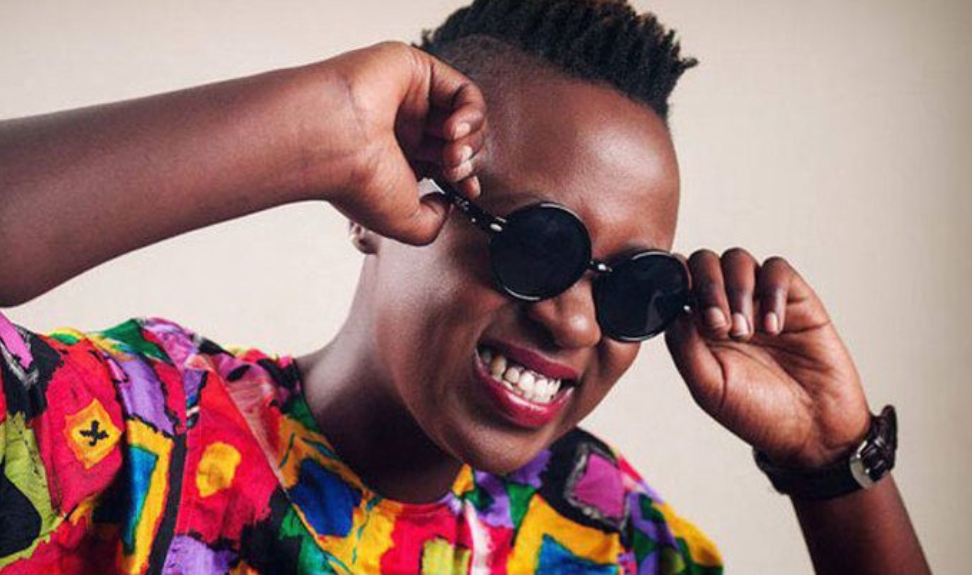Once phenom Ugandan rapper, Keko, is making headlines again but not for something she won continental fame for back in the day – music. This time it’s about her deteriorating state as a result of continued abuse of drugs.
Ugandans online have been reacting with regret following a Instagram live broadcasts that Keko did on Monday during which she was in a worrying physical state.
Her face appeared pale and her skin badly peeling off while she smoked and drunk alcohol. Police later came to her apartment to her rescue in what seemed like a response to an alert perhaps by Keko’s peers who had watched her broadcasts.
In interacting with the Police officers, Keko looks like she’s unaware of her surroundings.
This is the latest in a series of problems that Keko who rose to fame in 2010 with the release of “Fallen Heroes” and became a very influential figure in Africa’s hip-hop, is having with drugs. Her long struggle with drugs stems from fame, influence and a nose dive in her career in the wake of her deal with Sony.
At the height of her musical success in Uganda in 2012, the singer, real names, Jocelyne Tracey Keko, was signed by Sony Music Entertainment Africa, the local arm of Sony Music Entertainment. Sony is the second largest record company and the largest music publisher in the world.
A 24-year-old rapper had got a full management contract that put her on the same label as international acts like Alicia Keys, Usher, P!nk, Christina Aguilera, Pitbull and Chris Brown.
But soon, her shining career started to dim. She has previously said the Sony deal was “kind of hampering” to her career.
“The way they work is different. I have to follow their rules, I have to work with whoever they want me to work with. The Producers changed, the pattern changed. Usually, we would just go to the studio, work on a song and the next day, we put it on streets out there, Now you have to wait for them to cue it in and have them put it on a calendar,” Keko said in a 2016 interview with Kiss FM, while responding to why she had gone quiet after Make You Dance with Madtraxx.
After joining Sony, she waited four years until her album (Strides) came out in 2016.
According to her, the way things were moving (slowly) with her new Management (Sony), was what set off this chain of events that resulted into depression and later drugs.
“I went through a phase in my life where I got really depressed after I signed the recording contract. I was having relationship issues, musical issues and I’m very passionate about my music and that’s like my refuge. If my music is not going how it’s supposed to, I get very anxious and restless and very depressed. I started drinking alcohol, and I started smoking weed,” said Keko in 2018.
To quiet this confusion and fix her drug addiction, she took a musical break. This saw Keko check into rehab where she got therapy and bounced back.
In 2017, Keko moved to Toronto, Canada, to attend film school.
For her, leaving Uganda for Canada meant she got to live her life without being judged with the stereotype that Ugandans view gay people through. Keko had openly revealed she was gay and that she came out because “people need to live freer lives”.
“I’m sure everybody in the entire country knows I’m gay,” Keko said in a 2018 interview with The World.
Adding: “They are probably still [in] denial, but I’m not. I speak on it because there are so many kids out there that are like that … people always have that notion where they say, ‘Oh, [being gay] is such a Western thing, they are copying it from the movies.’ So, I speak on it because people need to live freer lives. And this is Africa. So, there is still a lot of time before that happens. But if they can look back and be like, “Well, Keko was not afraid to be open about it and stand up for herself, then I can just be myself.”
One can not say for sure how much the publicity around her sexuality would have impacted her career had she chosen to stay in Uganda.
Asked in 2016 on her drug problem and whether there was anyone in the entertainment industry who was looking out for her to ensure she didn’t relapse, she said everyone was pretty much still doing drugs.
The Ugandan entertainment industry has had many victims of drug abuse and still continues to. The list includes Henry Tigan, Jackie Chandiru, Bobi Wine, Nina Ross and Qute Kaye among others.
Like any other addiction, full recovery and restoration takes a while, especially when these celebrities are trapped in an environment that thrives on these drugs. Many of these victims have testified to struggling with loneliness and having nobody to talk to.
Keko’s former Manager, Shadrack Kuteesa, himself says it became difficult to help Keko at the time she was initially struggling with drugs simply because he himself (Kuteesa) was a drug addict.
“For me what made it so worse was I had moved from weed, to cocaine. And it hit me. it was more addictive,” Kutesa told NBS TV in 2019.
Kutesa who managed Keko prior to Sony attributes Keko’s drug abuse to many things. The fame, the Sony excitement, the media that came with it, and how to deal with all of this.
All this made her feel indispensable, affected her behavior and how she related with people, he said. Perhaps it built barriers around her too. Barriers that made it difficult to confide in anyone or those that could have helped fear.
Later, Kutesa together with Keko started “Sober Up So High”, a not for profit organization to help young people stay away from drugs. Its model is to use their personal testimonies to create awareness about drug use and prevention.
In 2016, Keko told CNN “Thirty years from now I see myself being a CEO of a recording company. I still feel like Africa is a very young market music wise, so I think the future is still very bright.”
However, the state that Keko, now 33, was in during Monday’s Instagram videos makes her dream nothing but just that – a dream – if she doesn’t get help.
The worst-case scenario would be losing her life to drugs as we have seen with many other celebrities including legendary soul singer, Whitney Houston.
Keko’s success
Keko’s breakthrough single How We Do It took the Ugandan music charts by storm, making her an instant household name in East Africa.
The success of the track led to a 2011 Channel O Video Music Award for most gifted East African Video, and more recently a synch with Supersport Africa.
Keko landed an endorsement deal with Pepsi and also led Mountain Dew’s advertising campaign in Uganda, all whilst growing her fan base across the continent.
She has performed at the annual Selam festival in Ethiopia and Big Brother Africa 6 live show in South Africa.









